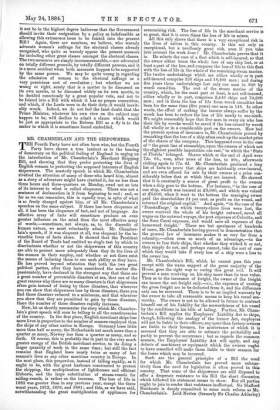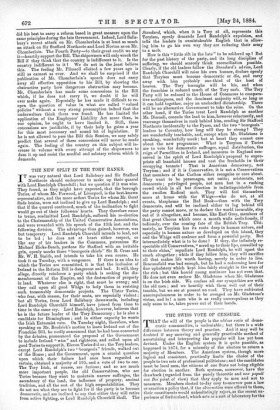MR. CHAMBERLAIN AND THE SHIPOWNERS.
THE Fourth Party have not often been wise, but the Fourth Party have shown a true instinct as to the bearing of democracy on the political feeling of England in urging on the introduction of Mr. Chamberlain's Merchant Shipping Bill, and showing that they prefer protecting the lives of English seamen to protecting the supposed interests of English shipowners. The masterly speech in which Mr. Chamberlain rivetted the attention of many of those who heard him, almost as a story of adventure might have rivetted it, for no less than three hours and three-quarters on Monday, owed not an iota of its interest to what is called eloquence. There was not a sentence of declamation in it from beginning to end ; and, so far as we can remember, this is equally true, in spite of what is so freely charged against him, of all Mr. Chamberlain's speeches on the same subject. If there has been eloquence at all, it has been the eloquence of fact, and not of language. An effective array of facts will sometimes produce an even greater influence on the mind than the most effective array of words,—sometimes, not always, as, to the discredit of human nature, we must reluctantly admit. Mr. Chamber- lain's speech, if it was eloquent at all, was eloquent by the in- vincible force of facts alone. It showed that the President of the Board of Trade had omitted no single test by which to discriminate whether or not the shipowners of this country are able to protect more adequately than they do the lives of the seamen in their employ, and whether or not there exist the means of inducing them to use such ability as they have. He has proved beyond refutation that both the two great political parties, after they have considered the matter dis- passionately, have declared in the strongest way that there are a great number of preventable disasters at sea, that one of the great reasons why there are so many disasters is that shipowners often gain instead of losing by those disasters, that wherever you can show that shipowners lose by those disasters, there you find those disasters reduced to a minimum, and that wherever you show that they are permitted to gain by those disasters, there the number of those disasters rapidly increases.
Now, let us shortly summarise the story which Mr. Chamber- lain's great speech will soon be telling to all the constituencies of the country. In the first place, English merchant ships lose more lives in proportion to the number of seamen employed than the ships of any other nation in Europe. Germany loses little more than half as many, the Netherlands not much more than a quarter as many, Norway less than a quarter as many, and so forth. Of course, this is probably due in part to the very much greater energy of the British merchant service, to its doing a larger quantity of work in the same time ; but still the fact remains that England loses nearly twice as many of her seamen's lives as any other maritime country in Europe. In the next place, this proportion, instead of falling rapidly, as it caught to be, with the great harbours constructed to protect the shipping, the multiplication of lighthouses and efficient lifeboats, and the large substitution of steam-vessels for sailing-vessels, is rather on the increase. The loss of life in 1883 was greater than in any previous year, except the three worst years, 1872, 1876, and 1881; and this, as we have said, notwithstanding the great multiplication of appliances for economising risk. The loss of life in the merchant service is so great, that it is seven times the loss of life in mines.
All this only shows that there is a very exceptional risk in the lives of sailors in this country. Is this not only an exceptional, but a needlessly great risk, even if you take into account the work done ? Mr. Chamberlain proves that it is. He selects the case of a fleet which is self-insured, so that the owner either bears the whole loss of any ship lost, or at least a part of the loss, and compares the loss of life in this fleet with the loss of life in the whole of the remaining steam marine. The twelve undertakings which are either wholly or in part self-insured comprise 396 ships and 18,400 men ; and during five years these undertakings lost only one man in 840 by wreck casualties. The rest of the steam marine of the country, which, for the most part at least, is not self-insured, either wholly or in part, comprises 3,446 ships and 70,600 men ; and in them the loss of life from wreck casualties has been for the same time (five years) one man in 148. In other words, the effect of making the insurer always suffer by the wreck has been to reduce the loss of life nearly to one-sixth. We might reasonably hope that five men in every six who lose their life by wrecks would be saved if the loss caused by wreck fell wholly or in a considerable part on the owners. How bad the present system of insurance is, Mr. Chamberlain proved by remarking that the loss of a ship often sends up the market price of the shares of the company. This happened even in the case of " the great line of steamships, upon the owners of which not the slightest possible imputation can rest," to which the ' State of Florida' belonged. Shares which at the end of April were 72s. 6d., rose, after news of the loss, to 90s., afterwards sinking again to 77s. 6d. Mr. Chamberlain produced a long list of facts to prove that ships are habitually over-insured, and are even offered for sale by their owners at a price con- siderably below that at which they are insured. He showed that it is constantly a source of great profit to the owners when a ship goes to the bottom. For instance, " in the case of one ship, which was insured at £9,000, and which was valued at £6,000, when it went to the bottom the managing owner paid the shareholders 24 per cent. as profit on the vessel, and returned the original capital." And again, " in the case of the Dunstaffnage,' in which twenty-three lives were lost, the owner received the whole of his freight outward, saved all wages on the outward voyage, the port expenses at Calcutta, and the Suez Canal expenses, and would save all expenses of the homeward freight." These are but specimens of hundreds
of cases, Mr. Chamberlain having proved to demonstration that the general law of insurance makes it so very far from a
calamity,—often even so much of an advantage,—to the owners to lose their ships, that whether they wished it or not, they simply do not, and perhaps cannot, take the sort of care which they would take if every loss of a ship were a loss to the owner too.
Mr. Chamberlain's Bill, which he cannot pass this year except with the warm support of the great majority of the House, goes the right way to curing this great evil. It will prevent a man receiving on his ship more than its true value. Then as to the insurance of freight, the owner of the freight can insure the net freight only,—i.e., the expenses of earning the gross freight are to be deducted from it, and the difference only can be recovered. There is to be an implied warranty by the owner to take all reasonable means to keep his vessel sea- worthy. The owner is not to be allowed in future to contract himself out of his liability for the seaworthiness of his vessel by the conditions in his bills of lading. Further, Mr. Cham- berlain's Bill applies the Employers' Liability Act to ships, though, following the analogy of the former Act, employers will not be liable to their officers, any more than factory-owners are liable to their foremen, for misfortunes of which it is assumed that they are able to estimate the probability and partly to prevent the occurrence ; but as regards the common seamen, the Employers'. Liability Act will apply, and any defects of machinery or equipment which the owners ought to have remedied will make them liable to their seamen for the losses which may be incurred.
Such are the• general principles of a Bill the need. for which Mr. Chamberlain has proved more exhaus- tively than the need for legislation is often proved in this country. That some of the shipowners are still disposed to offer a desperate resistance to his Bill the short discussion which followed his statement seems to show. But all parties ought to join to render that resistance ineffectual. Sir Stafford Northcote is deeply committed to some such reform as Mr. Chamberlain's. Lord Norton (formerly Sir Charles Adderley) did. his best to carry a reform based in great measure upon the same principles during the late Government. Indeed, Lord Salis- bury's recent attack on Mr. Chamberlain is at least as much an attack on Sir Stafford Northcote and Lord Norton as on Mr. Chamberlain. The Fourth Party—to their great credit we say it—heartily support the Bill. The shipowners will only wreck the Bill if they think that the country is indifferent to it. Is the country indifferent to it I We do not in the .least believe this. The feeling Mr. Plimsoll elicited a few years ago is still as earnest as ever. And we shall be surprised if the publication of Mr. Chimberlain's speech does not carry away all effective opposition to his Bill, by showing the obstructive party how dangerous obstruction may become. Mr. Chamberlain has made some concessions in the Bill which, if he does not carry it, we doubt if he will ever make again. Especially he has made it difficult to re- open the question of value in what are called " valued policies" without a very strong presumption indeed that the underwriters think there was fraud. He has limited the application of the Employers' Liability Act more than, in our opinion, he ought to have limited it. Still, these concessions are justifiable, if by their help he gains a year for this most necessary and sound bit of legislation. If he is not allowed to pass the Bill this Session, we may safely predict that several of these concessions will never be made again. The feeling of the country on this subject will in- crease in volume with every attempt of the shipowners to darn it up and resist the needful and salutary reform which it .demands.

































 Previous page
Previous page